The Wto Dispute Settlement Mechanism: A Developing Country Perspective » książka
topmenu
The Wto Dispute Settlement Mechanism: A Developing Country Perspective
ISBN-13: 9783030032623 / Angielski / Twarda / 2019 / 387 str.
Kategorie:
Kategorie BISAC:
Wydawca:
Springer
Język:
Angielski
ISBN-13:
9783030032623
Rok wydania:
2019
Wydanie:
2019
Ilość stron:
387
Waga:
0.74 kg
Wymiary:
23.39 x 15.6 x 2.39
Oprawa:
Twarda
Wolumenów:
01
Dodatkowe informacje:
Wydanie ilustrowane











